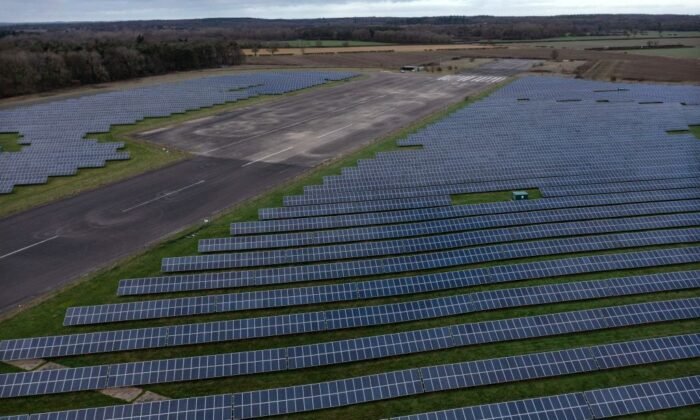Campaigners Assert Huge Solar Farms Will Replace Vital Agricultural Land
The solar farm trade association refuted claims that solar farms pose a threat to the UK’s food security, dismissing it as a myth.
Concerns have been raised by campaigners regarding the use of large solar farms on valuable agricultural land, potentially reducing the land available for food production.
Labour Energy Secretary Ed Miliband has relaunched the Solar Taskforce in an effort to triple the energy output from solar panels in the UK.
Shortly after winning the election, Mr. Miliband approved three major solar power projects totaling 1.3GW of capacity, including Gate Burton in Lincolnshire, Mallard Pass on the Rutland/Lincolnshire border, and Sunnica in Suffolk.
Critics, including former Energy Secretary Claire Coutinho, have warned that building solar projects on high-quality farmland puts the nation’s food security at risk.
The solar farm industry, however, maintains that solar farms occupy less than 0.1 percent of the UK’s land.
‘Best and Most Versatile’
Ms. Coutinho expressed concerns that climate policies should not jeopardize the nation’s food or economic security.
During the previous Tory administration, a policy was in place to ensure that solar projects align with food security considerations, citing “growing geopolitical tension.”
Good agricultural land is categorized into grades, with solar projects encouraged to utilize brownfield, contaminated, or industrial land, and lower-quality agricultural land to avoid compromising food security.
Mallard Pass
One of the approved projects, Sunnica, is one of Europe’s largest solar farms covering 2,500 acres, equivalent to a medium-sized town or 2,000 football pitches. The project aims to power 92,000 homes once completed.
Notably, the decision to grant development consent for such projects is final and cannot be appealed.
Local authorities such as West Suffolk Council and Suffolk County Council have expressed concerns about the scale and impact of these solar projects on the landscape and food production.
Myth
Gareth Simkins, a senior communications adviser for Solar Energy UK, clarified that the notion of solar farms posing a threat to food security is baseless and often exaggerated.
The report further emphasized the need for 90GW of solar energy by 2050 to meet net zero goals, which would still only occupy a minimal percentage of land, comparable to golf courses.
Efforts to reach Mallard Pass and the Department for Net Zero for comments were made.
PA Media contributed to this report.






